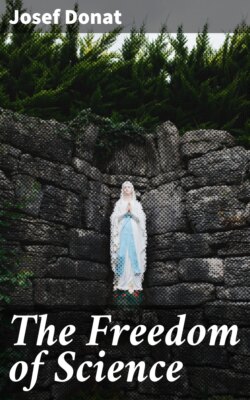Читать книгу The Freedom of Science - Donat Josef - Страница 27
На сайте Литреса книга снята с продажи.
Preliminary Remarks.
ОглавлениеTable of Contents
We must not stop at what we have just said in general about the relation between the freedom of research and the obligation to believe. We must go further into detail, in order to give a more exact explanation of how and where the authority of faith clashes with research and restrains it. Is it true that the believing scientist cannot move freely in his research, that there are barriers on all sides which he may not overstep? Is it true that the Church may prescribe for the Catholic scientist what he is allowed to defend and approve, what he ought to refute and reprove, suppress or advocate, so that his eyes must ever be turned towards Rome, to inquire and ascertain what might there be approved? And what a chain of proscriptions of free thinking is attached to the name of Rome! Index, Syllabus, Galileo—link after link is added to this chain of miserable slavery!
We shall say something more about this chain later on. First we must consider the principal question: Where and how do faith and science come in contact? And what we are going to say we shall condense into four points. Thus freedom of science will be more precisely defined; it will be shown what freedom revelation, and especially the guardian of revelation, the Church, offers to science: there can be no doubt that its natural freedom of exercise must be left to science intact.
We shall deal in the first place with the profane sciences, and, at least for the present, leave aside the discussion of theology, since it is clear that theology, being the science of faith, must assume a peculiar position in regard to the authority [pg 082] of faith: theology, moreover, is a special mark for attack; accordingly we shall deal with it particularly later on. However, the principles to be cited, being of a general nature, refer also to the science of faith, and for this reason we shall have occasion to refer to them.
